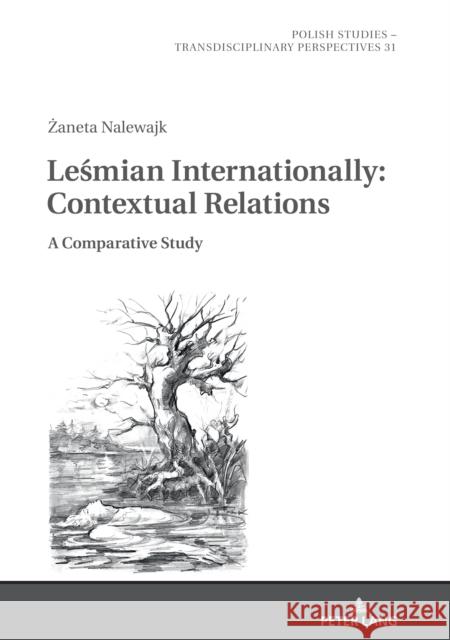Leśmian Internationally: Contextual Relations: A Comparative Study » książka



Leśmian Internationally: Contextual Relations: A Comparative Study
ISBN-13: 9783631820162 / Angielski / Twarda / 2020 / 348 str.
Leśmian Internationally: Contextual Relations: A Comparative Study
ISBN-13: 9783631820162 / Angielski / Twarda / 2020 / 348 str.
(netto: 341,37 VAT: 5%)
Najniższa cena z 30 dni: 355,51
ok. 30 dni roboczych.
Darmowa dostawa!
This study shows the literary legacy of Boleslaw Lesmian, the great Polish writer, as an example of inter-literary and inter-cultural transfer of aesthetics, styles, genres, motifs. The volume explores American, French, Russian, Ukraininan contexts (Poe's, Goglol's, Pushkin's, Baudelaire's, Balmont's, Gorodetsky's, Jesienin's writing) of his work.
Contents
I INTRODUCTION .................................................................................. 10
II CONTEXT AND METHOD .............................................................. 25
PROBLEMS OF CONTEXTS AND RESEARCH METHODS IN
COMPARATIVE STUDIES ......................................................................... 27
The subject of comparative studies ........................................................... 27
Typology of contexts ................................................................................... 29
Contextual analysis as a method of historical comparative studies ..... 34
Contextual comparative analysis of literary texts against the issue
of historicity ................................................................................................. 39
Aims of contextual comparative analysis ................................................. 41
III CONTEXT RELATIONS: LESMIAN COUNTERPOSED
WITH LITERARY PREDECESSORS AND CULTURAL
TRADITIONS .......................................................................................... 45
I CROSS-LITERARY FILIATIONS ............................................................. 46
Literary Mediations (Poe - Baudelaire - Balmont - Lesmian) ............. 48
Poe via the symbolists: searching for sources of Lesmian's
inspirations ........................................................................................... 48
Baudelaire's Poe .................................................................................... 51
Balmont's Poe ....................................................................................... 57
Translative replicas (Poe - Baudelaire - Lesmian) ................................. 64
Poe's tales in Boleslaw Lesmian's translations: sources,
inspirations, replicas ............................................................................ 64
Poe versus Lesmian: outlining the problem ................................ 64
Lesmian and translators: the Genesis of Fascination
with Poe ........................................................................................... 65
Poe translated by Lesmian from Baudelaire ............................... 73
Aesthetic transformations (the aesthetics of death: Poe
- Baudelaire - Balmont - Lesmian) ......................................................... 86
Ways of representing death ................................................................ 86
Aestheticizing death ............................................................................ 86
De-specification and/or alegorization of death ............................... 98
Macabre aesthetics ............................................................................. 106
Macabresque aesthetics ..................................................................... 115
Stylistic and structural influences (symbolist style - the bylina
tradition - the early prose work of Lesmian) ........................................ 130
The Symbolist Style of Boleslaw Lesmian's Early Work
(illustrated by the case of "Basn o Rycerzu Panskim"
["Tale of the Lord's Knight"]) ........................................................... 130
The lexical layer ............................................................................ 131
The structural layer ...................................................................... 134
Creative Inspirations or Influences? .......................................... 144
II THE INTERCULTURAL HOMOLOGIES .......................................... 146
The structural reminiscences (demonic female
characters: Pushkin - Gogol - Lesmian) ............................................... 148
Not just folklore: on neglected intercultural homologies ............. 148
The function of female demons in Romantic literature, and
their transformations in Lesmian's works ...................................... 152
The anticipation of death: the horror of self-knowledge ........ 152
The victims and/or avengers: the hell of memory .................... 154
Initiation into the experience of time: the hell of nature ............. 157
The grotesque figure of the witch: from Pushkin to Gogol
and Lesmian .................................................................................. 157
The Gogol context in Lesmian's "The Witch" ........................... 160
Grotesque embarrassment .......................................................... 163
Grotesque reconstruction of the stereotype of femininity ........... 165
Grotesque disillusion and social roles ............................................ 170
Metaphorical and parodistic-apocryphal transformations (forms
of kaliki perekhozhie: Yesenin - Gorodetsky - Lesmian) ..................... 175
Common cultural traditions? .......................................................... 175
The three poets' kaliki as protagonist or collective subject .......... 178
Kaliki of Gorodetsky and Lesmian as parodist and individual
characters ............................................................................................ 184
The protagonist on the road ............................................................. 199
Pilgrimaging kaliki-kaleki? .............................................................. 206
Homologies or filiations? .................................................................. 208
Genre and structural modifications, thematic references, lexical
repetitions (Lesmian's poetry and Ukrainian culture and folklore) ... 211
Ukrainian culture and folklore in Lesmian's poetry? .................... 211
Generic and structural modifications ............................................. 213
Thematic references ........................................................................... 222
Lexical repetitions ............................................................................. 226
How many traditions and cultures? ................................................ 229
IV LITERARY FOLLOWERS OF LESMIAN'S POETIC ............. 235
FROM ALLUSION TO LITERARY STYLIZATION: LESMIAN'S
INTERTEXT IN CONTEMPORARY POLISH POETRY ..................... 237
Lesmian: Poet with No Followers? .......................................................... 237
Parodist and pastiche stylizations ........................................................... 241
Continuations of Lesmian's aesthetics of death ..................................... 247
Continuations of Lesmian's erotics ......................................................... 252
IMITATORS? FOLLOWERS? SUCCESSORS? ....................................... 255
V CONCLUSION ......................................................................................... 257
BIBLIOGRAPHIC NOTE ........................................................................... 277
BIBLIOGRAPHY ............................................................................................ 281
INDEX ................................................................................................................. 331
aneta Nalewajk is a literature historian, comparativist and editor. She works at the Faculty of Polish Philology at the University of Warsaw, Poland. Her texts have been translated into English, Ukrainian, Russian, Bulgarian, Czech, Slovenian, Hungarian and Serbian. She has received several academic and editorial awards, both in Poland and abroad.
1997-2026 DolnySlask.com Agencja Internetowa
KrainaKsiazek.PL - Księgarnia Internetowa









